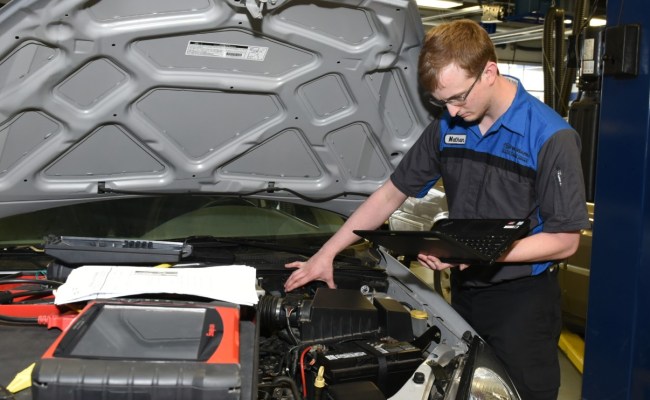
If you're having trouble with your car's engine, it may be time to consider a car tune up. These tune ups can make your car perform better and feel more comfortable. These are some helpful tips if you don’t know where else to look. Start by checking your engine and fluids. If the problem persists you may need to replace parts. You should also check for Check engine lights, which can indicate a problem.
Check engine light
If something is wrong with your powertrain, the check engine lamp will illuminate. This could increase tailpipe emissions or operating temperature, and cause an out of-spec event. Some drivers notice that their car performs worse after the light comes on. You should have your vehicle checked by a mechanic immediately. There could be an issue with the engine or any other part. The technician will quickly fix the problem by reading the diagnostic code.
Check Engine Lights can also be caused by intermittent fuel system problems. This could be caused either by an issue with the EGR or fuel system. You may also experience a low oil level or an oil pump failure. It could also be caused due to thermal breakdown. Digital trouble codes can be diagnosed using a code reader. Many times, the Check Engine Light will come on because of a simple connectivity problem.

Inspection of the engine
Before you get an engine tune, there are many things to be aware of. The oil, transmission fluid, differential/transfer case fluid, brake fluid, and clutch hydraulic fluid should all be at proper levels. It is also important to inspect the filters. Check the oil filter at least once every three thousand miles. Radiator and heater hoses should be free from sludge. Also, check the ignition timing. Older vehicles might need to adjust the idle speed or mixture.
To prevent costly repairs, it is crucial to examine the engine fully before any car tune-up. A tune-up will include an inspection of all moving components, including spark plugs. Automakers also recommend replacing worn components. Your fuel, oil, as well as air filters will need to be replaced. If you have any of these, make sure the technician uses original quality parts.
Inspection of fluids
The importance of inspection of fluids during a car tuneup is obvious: Engine oil is necessary for lubrication, while transmission and brake fluids keep the engine functioning. Antifreeze/coolant keeps lines from freezing while power steering fluid helps with power steering. Regular vehicle maintenance is not complete without checking these fluids. It is important to check them on a regular basis in order to ensure long-term vehicle health.
Check for any leaks in the cooling system. This is critical for engine operation. As antifreeze can get acidic, make sure that you have enough. Windshield washer liquid helps keep the windshield clean. Regular inspections of these fluids is advised for long-distance driving. Once a year, get your vehicle inspected by a mechanic for free! Visit a local mechanic if you need an expert tune-up.

Replacement of parts
Even if you don't drive your car often, it's worth taking it in for a tune-up. A tune up includes an inspection of the car's engine, fuel, ignition, and emissions. The technician will also inspect for any faulty parts, such as vacuum hoses and oxygen sensors. Bad oxygen sensors can cause significant problems for your engine computers and give false readings. In addition, a bad oxygen sensor can cause your car to lose up to 40% of its fuel economy.
When your car is being tuned up, be sure to inspect the air filter and any other worn-out components. Dirty filters can cause engine performance to suffer and other problems. This can lead to poor performance and other problems. An unclean air filter can also cause a richer fuel mix, which could lead to other problems and fuel waste.
FAQ
How do I prepare to be a mechanic apprentice?
It is vital to be able to comprehend what you are doing. You must understand the workings of cars. This will allow you to be prepared for your first day at work.
You also need to know how to fix simple problems such as broken lights, tires, etc.
This article will show you how to diagnose and fix issues.
It is also important to know how the different pieces fit together in order to put them together again.
Finally, you should be able use tools safely.
All of these factors will allow you to become a skilled mechanic.
Is automotive mechanic a promising career?
There are many exciting opportunities in the automotive industry for people who are driven to achieve excellence. Working hard and learning from others is the best way to be successful in this field.
Excellent communication skills are essential as you will spend most of the time speaking to customers or other employees. It's important to be flexible and willing to travel. This will make commutes difficult.
Consider taking classes at local universities or community colleges if your goal is to pursue a career in the automotive industry. Many schools offer programs for students who are interested to learn about auto sales, customer service, or repair.
You should choose to study mechanical engineering if you want to get a degree. It's possible to get a bachelor's degree in just four years.
Many employers will also hire graduates straight from school. So, it is wise to begin searching for employment while you are still able to study part time.
After your education is complete, you will probably need some training in order to become an automotive technician.
This means you'll need to pass exams such as the Automotive Service Excellence (ASE) certification exam. This test covers topics such engine maintenance as brakes, steering, suspension, etc.
After passing the ASE exam, you can apply for a National Institute for Automotive Service Excellence license.
A license allows you to perform repairs on vehicles owned by private individuals. You'll get compensation based on the amount of services you perform.
Not all states require licensing. However, if you plan to work outside your home state, you'll need to obtain a license.
Some states don't issue licenses until after completing a certain amount of training. If this applies to you, then you may need to find another option.
Is it worthwhile to become a mechanic?
The answer depends on what you are looking for in life. If money is your goal, then you can answer "yes". But if you are searching for meaning and purpose, then you should not answer this question.
It's not worth learning mechanics if you don’t have the skills. You'll waste your time. You won't become rich from it. It won't make your name famous. It is unlikely that your life will change.
It would take you years to learn how to do everything correctly. Then you'd still have to pay someone else to fix your car when it breaks down. Most people avoid doing this. They find something better to do instead.
To sum up, if you want to earn lots of money then go ahead. But if you want to live a meaningful life, stay away from the mechanic's industry.
Statistics
- Apprentice mechanics earn significantly less hourly than mechanics who have completed training, with a median wage of approximately $14.50 an hour, according to PayScale. (jobhero.com)
- According to the BLS, the median annual salary for automotive service technicians and mechanics in the United States was $44,050 in May 2020. (uti.edu)
- According to the BLS, total auto technician employment is expected to exceed 705,000 by 2030. (uti.edu)
External Links
How To
How to set up a business plan for a car repair shop
Before you can start any business, you must have a good idea of what it takes. The first step is to make sure that you understand what type of business to get into. It might be a good idea to start in a small community with few competitors. It will make it easier to find another job, even if things go wrong. If you want to open your own auto shop, you will need to find a location close to a large population. You'll have customers who can come see you when they need help and will also be able sell them new parts at affordable prices.
Franchise opportunities are a great option when you're just starting out. Franchises generally require less capital investments than traditional businesses. You still need to pay monthly royalties and fees to franchisors. It is important to be cautious when choosing a franchise. They often promise big returns but fail to deliver on those promises.
You could start your own auto shop if you have previous retail experience. Many entrepreneurs who have started their own businesses claim it was one of their best decisions. You must still create a business plan before starting. It is important to write down every goal you wish your business to achieve. This could include goals such as increasing sales or improving customer service. These goals can be written down and you can start looking for ways to reach them.
The next step in your journey to opening an auto repair shop is financing it. In order to finance their businesses, the majority of people borrow money from credit unions and banks. Banks usually require collateral. This means you must have something to offer as security. A few people will even borrow against their houses. You must show sufficient cash flow to repay the loan to be eligible for a loan.
After you have funded your business, you will need to obtain a license. There are several types of licenses that you can obtain depending on what kind of business you want to operate. Auto mechanics must have a state license while body shops only need a federal license.
Marketing strategies are the last thing that you should do. Before you even start advertising, think about what you want your business to stand for. What makes your business different from other companies? What can you learn from others? These questions are part of creating a strong brand image. This information will help you design more effective advertisements.